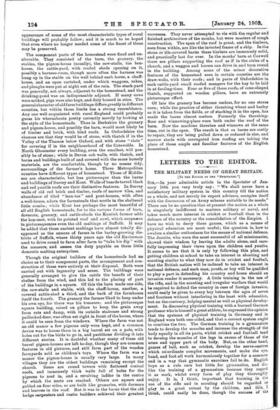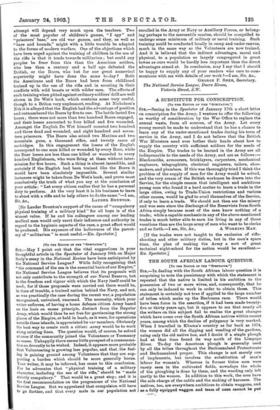LETTERS TO THE EDITOR.
THE MILITARY NEEDS OF GREAT BRITAIN.
[TO THE EDITOR OF THE " SPECTATOR.1
Srn,—In your admirable article in the Spectator of Jan- uary 10th you very truly say : " We shall never have a satisfactory military system in this country till the nation as a whole, and not merely its expert advisers, occupies itself with the discussion of an Army scheme suitable to its needs." There can be no question that at present the nation as a whole is singularly indifferent to matters military or naval, and takes much more interest in cricket or football than in the defence of the country or the consolidation of the Empire. I have no wish to decry these games, which as a means of physical education are most useful; the question is, how to awaken a similar enthusiasm for the means of national defence. The Jesuits, who were the most successful of all missionaries, showed their wisdom by leaving the adults alone, and care- fully impressing their views upon the children and youths. It seems to me that it is only by following this plan, and getting children at school to take an interest in shooting and scouting similar to what they now do in cricket and football, that the British nation will be induced to take an interest in national defence, and each man, youth, or boy will be qualified to play a part in defending his country and home should an invasion render it necessary. A little training in the use of the rifle, and in the scouting and irregular warfare that would be required to defend the country in case of foreign invasion, could easily be given to every boy between the ages of seven and fourteen without interfering in the least with education, but on the contrary, helping mental as well as physical develop- ment. In discussing physical training with a learned German professor who is himself a great athlete, he expressed the opinion that the systems of physical training in Germany and in England were both one-sided, and that a correct system ought to combine the two. The German training in a gymnasium tends to develop the muscles and increase the strength of the body equally in all its parts, whilst cricket and football tend to develop the muscles of the legs in excess of those of the arms and upper part of the body. But, on the other hand, games of ball, such as cricket, develop the nerve-centres which co--ordinate complex movements, and make the eye, band, and foot all work harmoniously together for a common end in a way that gymnastic exercises fail to do. English boys as a rule care but little for gymnastics, and dis- like the training of a gymnasium because they regard it as work, whilst every form of play they thoroughly
enjoy. It is, I think, important that training in EA use of the rifle and in scouting should be regarded as play to a great extent by the children, and this, I think, could easily be done, though the success of the attempt will depend very much upon the teachers. Two of the most popular of children's games, " I spy" and "prisoners' base," are old war games, and they, as well as "bare and hounds," might with a little trouble be adapted to the forms of modern warfare. One of the objections which have been urged against the training of children in the use of the rifle is that it tends towards militarism ; but could any peoples be freer from this than the American settlers, who less than a century and a half ago defeated the British, or the Boers, who but for our great numerical superiority might have done the same to-day ? Both the Americans and the Boers had been from childhood trained up in the use of the rifle and in scouting in their conflicts with wild beasts or with wilder men. The effects of such training when pitted against ordinary soldiers' drill are well shown in De Wet's book, which contains some very useful, though to a Briton very unpleasant, reading. At Nicholson's Nek it is alleged that the English had the advantage of position and outnumbered the Boers by five to one. The battle lasted five hours ; there were not more than two hundred Boers engaged, and their losses amounted to four killed and five wounded. Amongst the English De Wet himself counted two hundred and three dead and wounded, and eight hundred and seven- teen prisoners. The Boers also seized two Maxims and two mountain guns, a thousand rifles, and twenty cases of cartridges. In this engagement the losses of the Englisti correspond to one man killed or wounded by every Boer, while the Boer losses are less than one killed or wounded to every hundred Englishmen, who were firing at them without inter- mission for five hours. Such a thing is almost incredible, and certainly if the English had been trained like the Boers it would have been absolutely impossible. Several similar instances might be taken from De Wet's book, and prove most conclusively the truth of what you say at the conclusion of your article " Let every citizen realise that he has a personal duty to perform. At the very least it is his business to learn to shoot with a rifle and to help others to do the same."—I am, [Sir Lauder Brunton's support of the cause of "compulsory physical training of a military kind " for all boys is of the utmost value. If be and his colleagues among our leading medical men would only exert their influence and authority in regard to the hygienic aspects of the case, a great effect would be produced. His exposure of the hollowness of the parrot- cry of " militarism " is most useful.—ED. Spectator.]







































 Previous page
Previous page